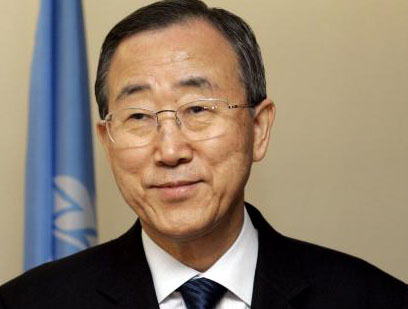Ban lays out humanitarian challenges for 2009
 Geneva - The cholera crisis in Zimbabwe is being compounded by the country's political turmoil, the United Nations has been less than successful in protecting civilians in the Democratic Republic of Congo, and no agreements have yet been reached on climate change.
Geneva - The cholera crisis in Zimbabwe is being compounded by the country's political turmoil, the United Nations has been less than successful in protecting civilians in the Democratic Republic of Congo, and no agreements have yet been reached on climate change.
These were some of the issues UN Secretary General Ban Ki-moon touched on while on a brief visit Friday to Geneva, which headquarters his organization's humanitarian and human rights teams.
Ban called the climate change treaty that was being discussed at an extended conference in Poznan, Poland, "the most complex and multilateral treaty ever."
While stressing that parties would need to reach an agreement "in just one year" at the next meeting in Copenhagen, he admitted that there were still differences between countries to overcome.
He urged nations working on stimulus packages to boost their economies to earmark funds for combating climate change.
"We can grow and be green at the same time," he said. The environment could not wait until the financial crisis was solved.
He also called on President Robert Mugabe to consider the wellbeing and future of Zimbabwe and its people, a thinly veiled jab at the 84- year-old autocrat. Ban also said leaders should stay in office only to ensure the good of their people.
Western leaders had more clearly called for Mugabe to step down.
A recent cholera outbreak has killed nearly 800 people so far in Zimbabwe and is continuing to spread, threatening neighboring countries.
The UN's chief was in town to take part in a commemoration of the 60th anniversary of the Universal Declaration on Human Rights, the most translated document in the world.
Regarding the incoming US president, Barack Obama, Ban expected an "even stronger partnership with the US," and hoped the new leader would engage with the Human Rights Council, which George W Bush shunned.
"You, its members," Ban told the Council during his address, "must rise above partisan posturing and regional divides."
A recent special session of the Human Rights Council on DR Congo ended with it issuing a condemnation of violence, but a lighter one than some Western nations had wanted and without taken any significant steps, after opposition from the African Group.
He had earlier commented to reporters that he was "saddened" to see, during his travels in the two years he has held his current position, "people who are abused and not properly protected."
He admitted that the UN, which has its largest peacekeeping force in the DR Congo, was unable to stop abuses.
"We have not been able to properly protect civilians in the region," he said, adding that the UN mission there needed more support and a clearer mandate.
UN officials have said the force is too small and to really offer a sustainable solution the number of troops would need to be boosted.
Ban promised to raise DR Congo again at the Security Council.
"It will be at the top of my agenda."
For the people of Darfur, the troubled region in western Sudan, he offered a bit more hope.
He expected more than half of the planned 26,000 UN and African Union troops to be in the country by year's end, and, while "ambitious", at the end of March 80 per cent of the soldiers should be on the ground. (dpa)